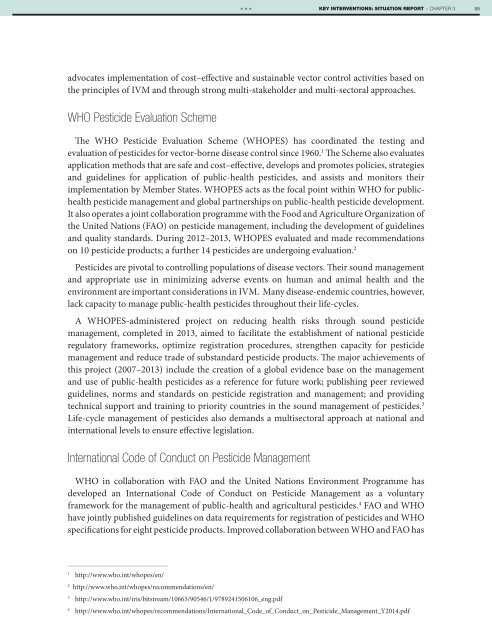1A9bnbK
1A9bnbK
1A9bnbK
You also want an ePaper? Increase the reach of your titles
YUMPU automatically turns print PDFs into web optimized ePapers that Google loves.
***<br />
KEY INTERVENTIONS: SITUATION REPORT − CHAPTER 3<br />
55<br />
advocates implementation of cost–effective and sustainable vector control activities based on<br />
the principles of IVM and through strong multi-stakeholder and multi-sectoral approaches.<br />
WHO Pesticide Evaluation Scheme<br />
The WHO Pesticide Evaluation Scheme (WHOPES) has coordinated the testing and<br />
evaluation of pesticides for vector-borne disease control since 1960. 1 The Scheme also evaluates<br />
application methods that are safe and cost–effective, develops and promotes policies, strategies<br />
and guidelines for application of public-health pesticides, and assists and monitors their<br />
implementation by Member States. WHOPES acts as the focal point within WHO for publichealth<br />
pesticide management and global partnerships on public-health pesticide development.<br />
It also operates a joint collaboration programme with the Food and Agriculture Organization of<br />
the United Nations (FAO) on pesticide management, including the development of guidelines<br />
and quality standards. During 2012–2013, WHOPES evaluated and made recommendations<br />
on 10 pesticide products; a further 14 pesticides are undergoing evaluation. 2<br />
Pesticides are pivotal to controlling populations of disease vectors. Their sound management<br />
and appropriate use in minimizing adverse events on human and animal health and the<br />
environment are important considerations in IVM. Many disease-endemic countries, however,<br />
lack capacity to manage public-health pesticides throughout their life-cycles.<br />
A WHOPES-administered project on reducing health risks through sound pesticide<br />
management, completed in 2013, aimed to facilitate the establishment of national pesticide<br />
regulatory frameworks, optimize registration procedures, strengthen capacity for pesticide<br />
management and reduce trade of substandard pesticide products. The major achievements of<br />
this project (2007–2013) include the creation of a global evidence base on the management<br />
and use of public-health pesticides as a reference for future work; publishing peer reviewed<br />
guidelines, norms and standards on pesticide registration and management; and providing<br />
technical support and training to priority countries in the sound management of pesticides. 3<br />
Life-cycle management of pesticides also demands a multisectoral approach at national and<br />
international levels to ensure effective legislation.<br />
International Code of Conduct on Pesticide Management<br />
WHO in collaboration with FAO and the United Nations Environment Programme has<br />
developed an International Code of Conduct on Pesticide Management as a voluntary<br />
framework for the management of public-health and agricultural pesticides. 4 FAO and WHO<br />
have jointly published guidelines on data requirements for registration of pesticides and WHO<br />
specifications for eight pesticide products. Improved collaboration between WHO and FAO has<br />
_____________________<br />
1<br />
http://www.who.int/whopes/en/<br />
2<br />
http://www.who.int/whopes/recommendations/en/<br />
3<br />
http://www.who.int/iris/bitstream/10665/90546/1/9789241506106_eng.pdf<br />
4<br />
http://www.who.int/whopes/recommendations/International_Code_of_Conduct_on_Pesticide_Management_Y2014.pdf


